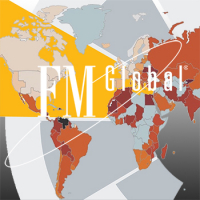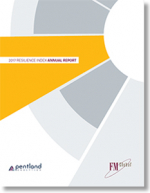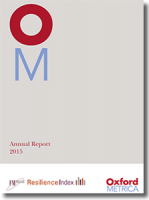The 2015 FM Global Resilience Index Annual Report
As globalization accelerates, business increasingly is conducted in a borderless, interconnected and almost invisible way, leading to a potential loss of strategic control.
Effective supply chain risk management is critical for swift recovery from unexpected, adverse events that disrupt business operations.
The 2015 FM Global Resilience Index offers powerful insights to help business executives target their investments towards more reliable returns and to protect their customers from unforeseen disruption.
The index provides an annual ranking of 130 countries and territories according to their business resilience to supply chain disruption. The scores that generate the ranking are calculated as an equally-weighted composite of nine core drivers that affect resilience significantly and directly.
This year’s index captures a fascinating mix of change and stability.
The key results are summarized below.
- Norway retains its top position in the index from last year, with strong results for economic productivity, control of corruption, political risk and resilience to an oil shock. The country’s management of fire risk offers opportunity to improve still further.
- Despite its massive oil reserves, Venezuela ranks 130, placing it at the bottom of the index, and reflecting the many challenges South America faces, ranging from economic and political to geological, with its west coast on the Pacific ‘Ring of Fire’.
- Taiwan has jumped the most in the index - 52 places in the annual ranking to 37; more than any other country. Its rise is due mainly to a substantial improvement in the country’s commitment to risk management, as it relates both to natural hazard risk and fire risk. Given the country’s location at the western edge of the Philippine sea plate, this is a welcome development.
- Ukraine, ranked 107, and Kazakhstan, ranked 102, dropped more places this year than any other country; a fall of 31 places each. Unsurprisingly, for Ukraine, the worsening political risk, combined with poorer infrastructure, was to blame. The fall for Kazakhstan this year reflects a poorer commitment to natural hazard risk management in the region.
- In the European Union (EU), Greece fell from position 54 to 65. The recent victory of the anti-austerity Syriza party almost certainly will usher in a period of greater friction and turbulence with its EU partners.
- France, ranked 19, trails Germany at 6. France has slid down the index in recent years reflecting a rising risk of terrorism - evidenced tragically in Paris - and deteriorating perceptions of both infrastructure and local suppliers. Also exposed to terrorism risk is the United Kingdom, which nevertheless held steady at 20 for the third year running, aided by its relative resistance to oil shocks.
Log in to download this paper.
What’s Related
Related Companies
FM Global
Related Topics
Risk Management
FM GlobalRisk ManagementSupply Chain
All topics
News




How Does Your Supply Chain Resilience Rank?
The 2017 FM Global Resilience Index is the first data-driven tool and repository that ranks the resilience of 130 countries and territories according to their enterprise resilience...
Understanding Supply Chain Resilience
Countries That Have the Most Resilient Supply Chains
More News
Resources

2017 Resilience Index Annual Report
See resilience in a whole new way, the new FM Global Resilience Index can help you better understand countries' business resilience to disruption, and provides critical insight to ...

The 2015 FM Global Resilience Index Annual Report
As globalization accelerates, business increasingly is conducted in a borderless, interconnected and almost invisible way, leading to a potential loss of strategic control.
More Resources
Favorites

How Does IKEA’s Inventory Management Supply Chain Strategy Really Work?
Each IKEA store is huge and holds more than 9,500 products! How in the world does IKEA offer so...

Starbucks as an Example of the Value Chain Model
The concept of value chain helps to understand and segregate the useful (which help in gaining a competitive...

7 Principles of Supply Chain Management Explained
Would you like to understand supply chain management concepts but don't have time to study from a textbook?...

Is Apple’s Supply Chain Really the No. 1? A Case Study
How Complex is Apple's Supply Chain? Some people in the blogosphere said that Apple's Supply Chain is not...

